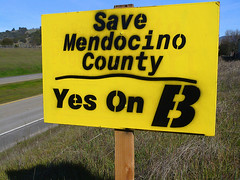A Bureau of Land Management program to find homes for wild mustangs bore unexpected fruit Wednesday when three of those horses and seven BLM employees worked to remove garbage left over from an illegal marijuana grow.
The remains of the 10-acre, 5,000 plant garden sit in a clearing about a mile from Highway 20.
"It's a really remote, rugged area," said BLM spokesman Jeff Fontana.
The garden was discovered two years ago by law enforcement officers, who eradicated the plants but left behind fencing, tarps, empty fertilizer bags, irrigation lines, sleeping bags and the general trash of a long-term camp.
Fontana said the BLM has been working for two years to put together the money and clear the environmental regulations required to haul out the garbage.
"A lot of planning had to be done," he said.
In some places the terrain is so rough that the BLM had to use a bulldozer to make the garden accessible.
Early Wednesday morning, BLM employees hiked into the garden to collect all the garbage at drop points where it could be loaded onto the horses.
The horses belong to Redwood Valley residents Kenny and Bev Klee. Kenny said he and Bev started acquiring horses from the BLM nine years ago through a program that corrals the horses and picks out the best ones for adoption in an effort to keep the population of wild mustangs manageable.
"They try to adopt them out to good homes," he said.
Kenny said he and Bev own four BLM mustangs and one wild mule.
Kennygenerally uses the horses as pack animals though the 50 bags of trash they hauled away Wednesday was unusual cargo. He said he was happy to do his part.
"It's good for the horses and it helps the BLM out," he said.
Fontana said using pack horses to haul the garbage out was an ideal solution.
"The horses are a good way to do it," he said. "It's low impact."
Fontana said the BLM hoped to have all of the trash off the site by day's end, but said the removal of the garbage would not completely eliminate the environmental effects of the grow.
He said at this garden, like at many others, the growers had mixed powdered fertilizer into water they used to irrigate the crop. That fertilizer runs off into the rivers and streams of the Russian River watershed and can have a negative effect on fish populations.
Large grows on BLM land are becoming increasingly common and tend to keep legitimate hunters, campers and hikers off the land, Fontana said.
According to the state Campaign Against Marijuana Planting, CAMP seized more than 135,000 marijuana plants in Mendocino County in 2006. Already this year, the County of Mendocino Marijuana Eradication Team has eradicated two gardens of more that 15,000 plants each.
Ben Brown can be reached at udjbb@pacific.net.






















No comments:
Post a Comment